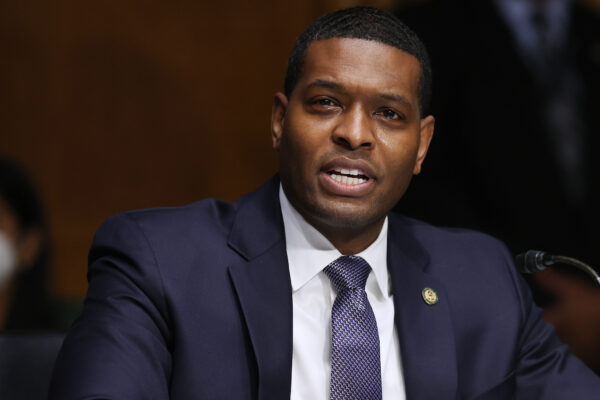The Environmental Protection Agency’s (EPA’s) proposed emissions standards for automobiles and trucks are raising eyebrows in the auto industry and Washington alike.
“EPA’s proposed emissions plan is aggressive by any measure. By that I mean it sets automotive electrification goals in the next few years that are … very high,” John Bozzella, president and CEO of the automaker trade organization Alliance for Automotive Innovation, wrote in an April 12 blog post.
The federal standards would tightly restrict emissions from new vehicles. That would effectively force automakers to boost their sales of electric vehicles (EVs).

The agency’s proposal anticipates that under the new standards, two-thirds of new light-duty vehicles sold in the United States would be electric by the model year 2032.
It also predicts that 46 percent of new medium-duty vehicles sold in the United States would be electric by that model year.
EVs made up less than 6 percent of total new vehicle sales in 2022. That’s an increased percentage relative to past years, even as total new vehicle sales were down to 13.8 million units from 17.3 million in 2018.
The EPA claims that its standards would lower carbon dioxide emissions by 10 billion tons.
Agency administrator Michael Regan described the standards as the “strongest ever” during an April 12 press conference.
“The proposal exceeds the administration’s own 50 percent electrification target,” Bozzella wrote, noting that his industry is “fully committed to an electric and low-carbon transportation future.”
Not Enough Chargers
Less than two weeks ago, the IRS and the Treasury Department issued complex guidance on EV tax credits that could make it harder for consumers to benefit from those financial incentives.
Bozzella, who began his career working for then-New York Mayor David Dinkins, a Democrat, said the guidance would reduce the number of vehicles qualifying for tax credits. That would seem to disincentivize EV adoption even as the administration steps up other measures intended to facilitate more EV purchases.
Bozzella also said the 100,000 public, nonproprietary EV chargers in the United States are “not enough.”
An April 6 memo from the automotive alliance stated that electrification would take a “massive, 100-year change to the U.S. industrial base and the way Americans drive.”\
Groups outside of the auto industry also voiced concerns.
Will Hild, executive director of Consumers’ Research, a consumer protection organization, said the standards are “the same thing BlackRock and ESG extremists like Larry Fink are doing with U.S. pensions and retirement dollars.”
“The American people won’t stand for it,” he said.
Republicans Object
Republican lawmakers on Capitol Hill criticized the announcement, which comes days after new EPA coal plant standards and vetoes by President Joe Biden aimed at furthering the president’s environmental agenda.
“The Environmental Protection Agency will make cars unaffordable by following California’s lead towards a complete ban on gas-powered vehicles,” said Rep. Cathy McMorris Rodgers (R-Wash.), who chairs the House Energy and Commerce Committee.

WASHINGTON, DC – MARCH 08: U.S. Rep. Cathy McMorris Rodgers (R-WA) speaks at a House Republican news conference on energy policy at the U.S. Capitol on March 08, 2022 in Washington, DC. The Republicans said they support Biden’s ban on Russian oil imports but urged for increase domestic production to help curb high gas prices. (Photo by Kevin Dietsch/Getty Images)
California’s 2022 plan would outlaw gas-powered vehicle sales in the state by 2035.
“[Biden’s] misguided policies are hurting American families while helping China,” said Sen. John Barrasso (R-Wyo.), the ranking Republican member of the Senate Committee on Energy and Natural Resources.
“The ‘electrification of everything’ is not a solution. It’s a road to higher prices and fewer choices.”
Sen. Shelley Moore Capito (R-W.Va.), the ranking Republican member of the Senate Committee on Environment and Public Works, highlighted some potentially significant issues for the United States as the domestic EV fleet expands.
“These misguided emissions standards were made without considering the supply chain challenges American automakers are still facing, the lack of sufficiently operational electric vehicle charging infrastructure, or the fact that it takes nearly a decade to permit a mine to extract the minerals needed to make electric vehicles, forcing businesses to look to China for these raw materials,” Capito said.
Rep. Bruce Westerman (R-Ark.), who chairs the House Committee on Natural Resources, said in a statement to The Epoch Times that “EVs should be part of the equation, not the entire solution.”

He suggested that Americans would be better served by H.R. 1, an energy bill championed by Republicans that passed the House in March.
Senate Majority Leader Chuck Schumer (D-N.Y.) has said the bill will be “dead on arrival” in the upper chamber, and the White House on March 27 said Biden would veto it “in its current form.”
Sen. Joe Manchin (D-W.Va.), Tesla, and Ford didn’t respond by press time to requests by The Epoch Times for comment. Toyota directed The Epoch Times to Bozzella’s April 12 blog post.
SAE International, an engineering professional association with close ties to the automotive sector, had no comment.


